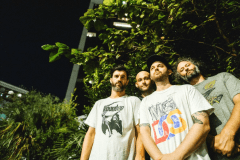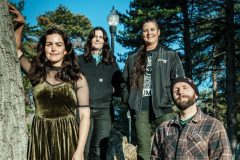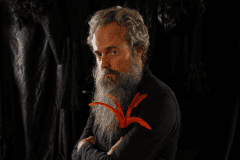Whether you know the name or not, you’re almost certainly familiar with the sound that Nightmares on Wax helped to create. Since the first album was released over a quarter of a century ago, George Evelyn has been pioneering a fusion of hip-hop, soul, r&b, pop, rock, classical, and just about anything else he could dream up.
Cited as one of the primary architects of trip-hop (along with groups like Massive Attack), Nightmares on Wax have helped to shape a sound that has become one of the cornerstones of modern music. His new album, Shape the Future, is the first album in nearly half a decade, and it will be both familiar and thrilling to longtime fans, with the kind of deep in the pocket grooves and sticky melodies Nightmares on Wax is known for, along with a new focus on vocals, including some that bring Evelyn in front of the mic much more fully than before.
Ghettoblaster: For the new album you’re really front and center on the cover. Why did you decide to step out like that?
George Evelyn: Well I mean, In A Space Outta Sound alright I was on the cover but I had my back on the cover, rear set on the speaker, but… yeah there was a lot that was kind of discussed with me and my team about the identity of Nightmares on Wax and how… with my fan base, it’s split with my DJ fan base, with my old school fan base, and then there are the new school people who are into Nightmares as well. There seemed to be an element of what Nightmares on Wax is. So we were like “Let’s just be totally upfront about it,” and plus as well I’m a lot more at the forefront in this record, so we were like, “You know what…” and they just put it through really. Also to really express the artistic side of me, not just a DJ making music you know?
GB: For this album for the last couple of albums you’ve been working a lot more with live musicians in more of a collaborative sense. Does that create more of a back and forth, or is it more you conducting a group of musicians similar to working from samples and electronics by yourself?
GE: It’s a little bit of both really, ‘cus initially I put the ideas together and then the more I get deeper into the tracks the more I start to expand on the sound and then the song reveals to me what I feel I need to add to it to take it to the level it needs to be at or to open the actual production up. So I might initially go into a song and it might be straight up keys and beats and just electronic production in that sense, but then I might see a deeper level of orchestration in there and literally since really Smoker’s Delight I’ve always favored having the live element involved in my music anyway. I think the emotional aspect of that is super important and I set myself the… it’s like to have the personal mission that I want to make the perfect marriage between analog and digital. And I find with each album I’m getting closer to that and in order to really, really fully accomplish that I think the live element is super important but without taking anything away from the digital element.
GB: When you decided to work on that live element, especially bringing in orchestration, and fusing the two, did you look at other artists in particular who have tried to work with orchestration? Are there any in particular who inspired you in that direction?
GE: No, definitely I would say, if anything, I still think my sampling format is a very hip-hop approach. I would probably have looked to more my mentors in their production work like Quincy Jones and Curtis Mayfield or Gamble and Huff as well, I would look at the way they would orchestrate stuff but still have the funk undertone. Mine to me would, add in the orchestration with an electronic sample base, hip-hop undertone. But with that old school approach involved in it.
But then within that as well, the way that my… let’s say, the way that my imagination works and what I try to tap into, I always try to tap into the space and the sound that’s not really there but it’s more the ghost that’s in the sound and that’s where I’ll probably dig deep and I’ll find something I can orchestrate or a melody I can pull out. Then I’ll work with somebody like Sebastian Studnitzky, who’s an amazing trumpeter, melody composer, amazing pianist, and I’ll express that to him and he’ll help me score it, in a way, the way that I’m trying to express it because I’m not classically trained in any way I can’t read music or anything like that, I just have my ears and my feeling.
I’m very fortunate that I have incredible musicians at my fingertips that can help me, almost, mediate that.
GB: As someone who’s not classically trained, can’t read music, that kind of thing, were you at all intimidated at the idea of working with classically trained people?
GE: No. Many, many years ago I was, when I was doing probably Carboot Soul and stuff like that, when I worked with a 52 piece orchestra on the track “Les Nuits.” Back then I think probably at that time I probably was a bit more self-conscious about my ability but now I’m at a stage in my life and in my career that I feel super liberated in what I’m doing and I really trust and believe in what I’m feeling. So I don’t kind of… You know, even when I’m working with the caliber of musicians I’m working with, I don’t ever feel… the need to feel lesser. If anything they bring the best out of you.
GB: You’ve been working on Nightmares on Wax for nearly 30 years now, since at least the late 1980s, and I was just wondering, is there anything that you need to do when you’re working on it to keep it interesting and relevant to you as a person?
GE: To be honest with you I think it’s the joy of discovery really, more than anything. I’m always making music, but I’m not always making music. So, I’m not like… don’t like sit down and go “right I’m making an album”, so I’m always knocking little ideas together and stuff like that, and it’s amazing the way some of these come round and then they end up being part of the path or the story of an album. The intention of the individual tracks is never an album, it’s just like “Let’s just make some music, let’s find out what I’m feeling, let’s find out what’s turning me on”, and then within that, find out what I’m expressing and where I’m at in the world at the moment.
So, what happens in that, eventually I get to a place where a collection of music starts to appear. There’s an awareness that appears as well and to me, I’ve probably been doing that all my career, but, sounds funny but I wasn’t aware of the awareness. But now I see the light of the story anyway. Everything you’re doing every day is a story. So rather than trying to… Even though there’s discovery in there it’s not like I’m consciously looking for something, I’m allowing it to happen. Through being in a space of allowing it and being like that with my music and having a relationship with music like that now, there’s no writer’s block.
The thing is for me, the whole writer’s block thing is when you’re trying to channel all your energy into one thing and you’re determined, like “I’m making an album, I’ve got to finish an album.” That kind of thing, that’s counterproductive for me. To make music in a more liberal way and take your life into it, life experiences on board as they come and make things and kind of to see where you’re at rather than deciding where you’re at before it even appears to you. That’s what keeps it interesting and that’s what keeps the creation flowing for me.
GB: It’s interesting because Nightmares on Wax has existed in so many different ways, you obviously have your albums, you have live shows with a band, you have DJ sets and you have mix records. If you had to pick one of those formats, is there anything that you keep on coming back to, you say “This is really where my home is in this”?
GE: DJing. Because yeah, I realized that probably 6 or 7 years ago when I started my residency up at my own event in Ibiza. And at the same time I was making some music and stuff and I had this big flashback that this was how I started. I started playing at parties, playing at clubs and then I started making music. And then I had my own club night with my original partner Kevin, and we were making music at the same time and testing it out at the club.
Now when I went from that, went from releasing albums and touring and getting into that cycle, I stopped having a residency, I was DJing all over the world and doing all these things but I didn’t have residency and that aspect of it almost… I understand it, but I forgot the connection between my DJing and the production and how important that is. That made me realize that actually as much as I’ve become a producer and an artist in the way that I have, that my foundation is still DJing. I am an artist but it’s the DJing that got me here in the first place so I think that that ingredient is so important because it also gives me an alternative perception of how I make music.
GB: Nightmares on Wax is often cited as one of the prime innovators in trip-hop and down tempo and other electronic music that came out in the 90s and the 00s, and that fusion of hip-hop with all sorts of other genres has become so ubiquitous throughout culture as hip-hop has become the dominant musical form in the world these days. Do you feel vindicated by that, or do you feel when you’ve got a pale imitation of “You Wish” playing it’s a diminishment of what you were trying to accomplish?
GE: No, I think it’s a dangerous area when you get involved in comparisons and, almost, like this kind of self-importance of worth. I just think it’s not… Probably when I was younger I thought like that but I don’t think like that now. I think if you put too much energy into things like that it’s not really gonna benefit you. So, in all honesty, all music is inspired by music, so it’s just whether it’s done consciously or subconsciously. And I prefer the latter.
GB: As someone who was working and bringing hip-hop into other types of music, rock and classical, R ‘n’ B and soul, even house and techno with your last EP from 2016, do you feel vindicated by the fact that hip-hop has become such a dominant force in the culture across the world?
GE: I have such a massive affiliation with hip-hop because it’s what got me to where I am, it’s the thing that blew my world apart, really. As a 12-year old boy, it changed my life. I had quite an experimental mindset coming from the reggae sound system background, and it was all do it yourself, building speaker boxes and that kind of stuff so, and there was obviously a DJ selector, and an MC on that platform, so when hip-hop came along, along with the elements of graffiti and break dance and stuff like that, it totally blew my world apart. I feel I have … I wanna say twisted but in a beautiful way, perception of things and the way that I like to see things, that hip-hop just totally fell in line with me on that. Everything about it was like, you make do with what you’ve got, you make something happen out of what you’ve got. And what you have might be fuck all! But you make something happen, you express yourself, and through that mindset and through that soul set it really woke me up to something and gave me this excitement and adventure and creativity. I always say that for me the meaning of hip-hop is… hip-hop is anything and everything that ever influenced it, which just covers everything. It just covers everything.
I just love the chemistry of it, and all that sort of stuff, I don’t really get into these debates where a lot of people go. “Yeah but hip-hop’s not what it was, da-da-da,” and all that kind of stuff. For me, I can still go out and listen to hip-hop, but it just depends on what people are calling hip-hop nowadays. There are still amazing people were making music, there are still producers doing stuff, it might not be the majority that are listening to it, but there’s still amazing music happening. So, I think that when people get into these heated debates about what some of the rappers are like nowadays, to me there’s not really a comparison so I don’t really get into it. I just stick to the stuff that I really like.
Words by Aaron van Dorn
Facebook | Instagram | Twitter







Social Media